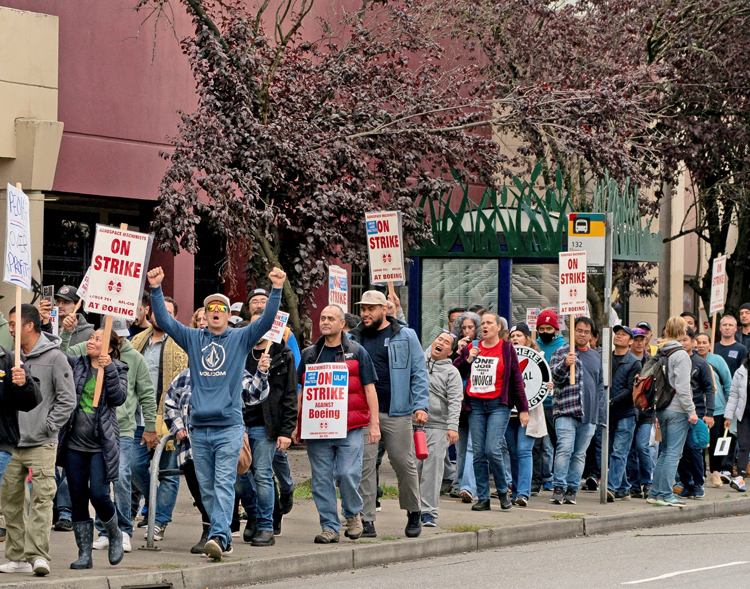SEATTLE — After a seven-week strike, the Machinists at Boeing voted Nov. 4 to accept a four-year contract by 59%. It includes a 38% wage increase, a significant raise over the 25% first offered by the company in September.
“Without that kind of raise, how can the younger workers survive with the cost of living in this area?” Tom Mercer, who’s worked at Boeing for 29 years, told the Militant. “I’m barely getting by myself and I’m at one of the higher wages.”
Asked about bosses’ threat to move production elsewhere, Mercer said, “We’ve been through this before. Workers in those nonunionized plants in the country will realize that they will need to fight for a more livable wage. They will see the need to organize there too.”
The 33,000 members of International Association of Machinists District 751 and District W24 also got a signing bonus of $12,000, paid parental leave and continuation of the annual bonus program.
The workers did not win reinstatement of the pension plan. The company did not budge beyond agreeing to increase its contribution to workers’ 401(k) plans.
More than 26,000 union members voted on the contract, a turnout of nearly 80%.
“A lot of people were hoping to get a pension back after the first two offers were rejected,” Boeing worker Roger Bland told the Militant, “but there was a large group of workers who said, ‘We should go back to work.’ Over time more thought the pensions would never come back.
“When workers had different opinions on what the union should do, discussions on the picket line were civil,” he said. “We learned what it means to be a union, to be part of a picket. We got to know each other and each other’s strengths.
“It was a great experience. It gave Boeing a taste of what we’re capable of,” he said.
“I’m conflicted on it,” Kelsey Eagan, who’s worked at Boeing for two years, told the Militant. “There’s definitely some good things in it, but we still had fight left in us, I think. There’s things that could’ve been addressed, like lowering medical costs.
“I think the strike was worth it,” he added. During the strike workers won solidarity from fellow unionists, local businesses and farmers.
The agreement was an important advance over the concession contract pressed on workers in 2014 after bosses threatened to move production from the Seattle area. That contract froze the pension plan, eliminated it for new hires, increased medical insurance costs and locked workers into a 0.5% annual wage increase for eight years, during a period when inflation soared.
This time union members were determined to fight. When Boeing first offered a measly wage increase, combined with a proposal to eliminate the annual bonus, workers resoundingly voted down the offer by 96% and walked out Sept. 13.
In the contract the company also agreed to build its next new airplane in the Seattle area.
The strike at Boeing was one of a series of recent union battles by hundreds of thousands of autoworkers, nurses, dockworkers and others who have stood up for better wages and working conditions.
Its outcome will buoy others currently on strike, from hotel workers in San Francisco, to oil refinery workers at Marathon in Detroit, the United Auto Workers on strike at Eaton Aerospace and others.
Every one of these fights deserves support. Organizing solidarity is key to defending workers’ interests and strengthening the labor movement.
Rebecca Williamson and Vincent Auger contributed to this article.


